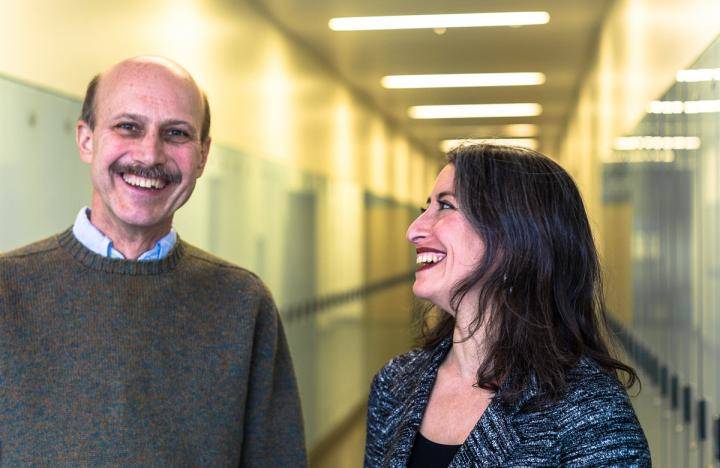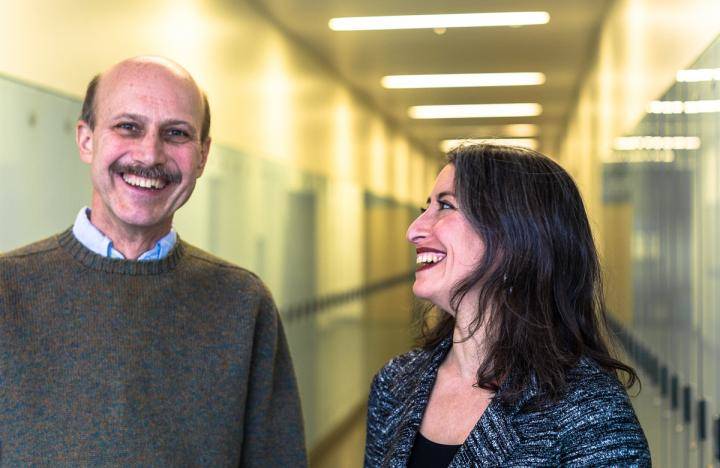
Credit: Photo credit: University of Toronto.
People whose immune systems are compromised from illnesses such as cancer can also fall victim to infections caused by fungal pathogens, which have become a major health and economic burden in healthcare systems.
In the US, more than $2.6 billion is spent on treating invasive fungal diseases.¹ Worldwide, fungal infections sicken billions of people and kill 1.5 million people every year.²
GlycoNet is funding translational research to test a unique approach using drug-like molecules that inhibit attachment of cell surface carbohydrates and have been shown to alter and weaken diverse medically important fungi. The project is led by Network Investigator, Leah Cowen, (University of Toronto) and her colleague Luke Whitesell (University of Toronto).
Cowen says glycans (carbohydrates) play a key role in how a fungal pathogen interacts with immune cells in the body.
"Carbohydrates decorate the exterior cellular surface of fungal pathogens," says Cowen. "They play an important role in both the biology of fungi and how they interact with host immune cells. In fact, they can even enable the pathogen to evade immune detection."
Whitesell says there is an urgent unmet need for developing new therapies to target these fungal pathogens.
"Our approach is based on a way of inhibiting the growth of fungi which makes them essentially more visible to a person's immune system," says Whitesell. "This approach using these specific molecules has never been used as an anti-fungal therapeutic before."
Whitesell says fungal infections can be fatal for certain people, if left untreated.
"Fungal pathogens are organisms that people with compromised immune systems are most likely to have problems with," says Whitesell. "This would include cancer patients and people undergoing organ transplants who have to be on immune suppressive therapies. A person is most often already sick from some other disease and that is when these infections come into play. In such situations, these fungal infections can be very aggressive and extremely difficult to control, such that death is a distressingly frequent outcome.
Most drug therapies attack and kill the fungus leaving the body to clean up the debris. Cowen and Whitesell's approach is different — it alters the way the fungus is seen by the body so that the immune system can more effectively respond to it.
Because glycans are involved in the assembly of the fungal cell wall, the molecules impact the fungus by weakening the cell wall and making the organism swell up. The result is the fungus becomes crippled and fragile, and is eventually eliminated from the body.
GlycoNet's funding is being used to produce adequate amounts of three of the most promising molecules at a drug quality level, in order to test them in animal models of invasive fungal infection.
While the two researchers are excited at the prospect of developing a new approach to treating fungal infections and early results have proven no issues with toxicity, Cowen says this new approach has to survive the next stage, the proof of concept.
"This is our first interaction with GlycoNet and we're very excited about this project," says Cowen. "This funding is crucial to confirm proof of concept. Moving forward requires that we synthesize sufficient quantities of these compounds, assess the stability and drug-like properties of the compounds and conduct animal experiments to show this can actually work as a strategy."
If the project can establish the molecules have an impact without serious toxicity issues, Whitesell and Cowen hope a biotech firm will take this research and move it through to the next stage of drug development.
"Once we've established the proof of concept, our hope is that Bright Angel Therapeutics, a small Canadian biotechnology firm devoted to the development of anti-fungals, would be interested in this and see sufficient commercial potential," says Cowen. "They would pursue the later stages of pre-clinical development, including the studies that would be required to file an investigational new drug application and get approval to perform clinical trials in people."
"A key part of GlycoNet's knowledge translation strategy is to help foster and accelerate partnerships between research and industry," says Todd Lowary, Scientific Director, GlycoNet. "We see great potential in this glycomics-based approach one day becoming a therapy to help millions of people worldwide deal with these types of deadly infections."
Whitesell, Bright Angel's co-founder and scientific advisor, says if Bright Angel doesn't take the project forward, he hopes another biotech will. If that happens, Whitesell says the two most likely real-world applications for an actual drug would be as a tablet or an injection.
###
Other partners contributing to the project include the Ontario Institute for Cancer Research, University of Toronto, Toronto Research Chemicals, Transplantation-Oncology Infectious Diseases Program of Weill Cornell Medical College of Cornell University, New York and MaRS Innovation, a Toronto-based provider of commercialization services, early-stage funding, and deal-brokering with industry and private investors.
¹ https://www.ncbi.nlm.nih.gov/pubmed/11873380
² http://stm.sciencemag.org/content/4/165/165rv13.full
Media Contact
B. Poitras
[email protected]
780-492-4355
@glyconet_nce
Original Source
http://canadianglycomics.ca/research-with-made-in-canada-molecule-targets-fungal-infections-worldwide/





